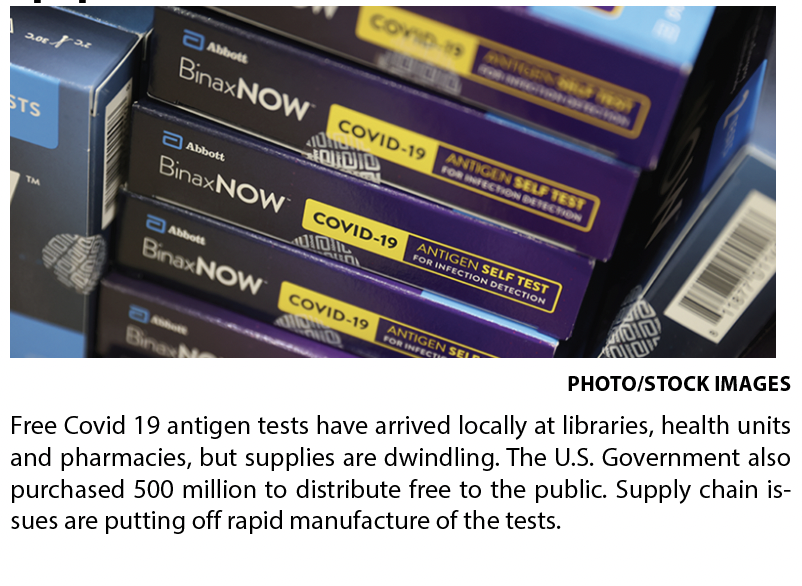
Tammy Curtis, Publisher
Jan. 26, 2022
With the third wave of the Covid-19 pandemic, Omicron, in full swing, and numbers of positive cases setting records every day, free Covid 19 tests have been made available to the public.
The need for tests has never been greater, but receiving them may not be as easy as it sounds.
With a cumulative total over a quarter of a million cases in the state, and rising each day, at home rapid testing kits have been heavily utilized by many who opt to self quarantine. Others opt to take the tests at home before going to a medical provider for diagnosis. Throughout the pandemic, testing has been a vital tool in the control of the spread of Covid.
The problem is, as it has been since the beginning, the manufacturers of the tests face the same issues in their facilities as any other workplace… workers contracting the virus, missing work and supply chain issues.
Last week as the U.S. Government launched a website for Americans to sign up to have free, rapid, at home tests delivered to them, manufacturers were dealing with their own issues. Shortages of raw materials, packaging and delivery drivers made its way down the entire supply chain, slowing the manufacturing process of the much needed tests. This makes a daunting task of the ultimate goal of manufacturing and distributing 500 million free tests the U.S. government purchased. This, combined with a large portion of the work force in quarantine for the virus, puts a further strain on the companies. They have been forced to increase wages to meet hiring goals.
San Diego based Quidel which makes over 40 million tests each month has plans to nearly double that to 70 million by next month. Douglas Bryant, CEO of the company, told NBC news he and many of his colleagues have had to be in quarantine. They also face struggles related to hiring an additional 400 for a new production facility.
The 500 million tests the government has contracted from the suppliers is not the company’s only production issued, they still have to supply their regular customers with kits even with the increased demand. The Department of Defense awarded contracts to Abbot, Roche Diagnostics and iHealth Labs last week for 380 million of the 500 million total tests. Production lines at the facilities are working around the clock, and Abbot is building two additional facilities, creating jobs for thousands.
According to research by Arizona State University, currently 260 million rapid at home tests are produced each month by all suppliers in the U.S. . This number is projected to rise to 526 million by March.
Among the items the companies are having problems obtaining is nitrocellulose membrane that has been what has slowed down some of the production. This is the actual fabric used to form the test strip.
Rachel Bloom-Baglin, a spokesperson for MilliporeSigma, a subsidiary of Merck KGaA, in Germany, that supplies nitrocellulose to major U.S. rapid test kit makers, said in a statement that “raw material availability to make nitrocellulose membrane is readily available, but the world does not have enough membrane manufacturing capacity to turn the raw materials into finished goods, which are then used by our customers to manufacture rapid antigen tests.”
The company currently makes the product at a facility in Cork, Ireland. Last year, it completed an expansion, planned before the pandemic, that doubled its capacity. Even that proved insufficient to meet the soaring demand.
A $136.7 million government contract was awarded to MilliporeSigma a few weeks ago to construct a new facility in Wisconsin. They will manufacture the vital component of the tests, helping increase the production numbers for the test manufacturers.
While it may be a wait for the tests that will be delivered to homes in the U.S. through the U.S. Government, Arkansans have an option with a small window of time that is closing rapidly.
On Jan. 11, 1.5 million rapid at-home tests became available to the public after the State of Arkansas purchased them. The kits are free of charge. Each kit, which contains two tests, is available per person or three kits per family.
In Sharp County, the tests are available at the Sharp County Health Department and Sharp County Libraries in Cave City, Evening Shade, Hardy and Williford, the Ash Flat Library at the Cave City Pharmacy.
In Fulton County, they are available at the Fulton County Health Department and Fulton County Libraries in Salem, Viola and Mammoth Spring.
By Friday, Governor Hutchinson spoke of how rapidly the tests were being picked up across the state with dwindling numbers remaining at the public locations.
Those who do not feel comfortable with the self testing may also go to several of the Covid 19 testing sites that include all county health units, many hospitals and independent pharmacies. Others may have a cost associated with the tests.
Tests were sent to each location based upon population and Covid infection numbers. While some libraries still had tests on Friday, consumers were encouraged to call before making a trip to the location. Libraries in the area said they received only limited numbers and are not certain when they will be restocked.
The alternate option is free tests from the Federal Government through the U.S. Postal Service. Every valid U.S. residential address can order the tests and have them shipped for free. The tests c contain four individual rapid antigen tests. Orders can be made by visiting special.usps.com/testkits and filling in shipping information. The website says the tests will ship in seven to 12 days, but due to the supply chain issues with manufacturers, the wait may be much longer.
